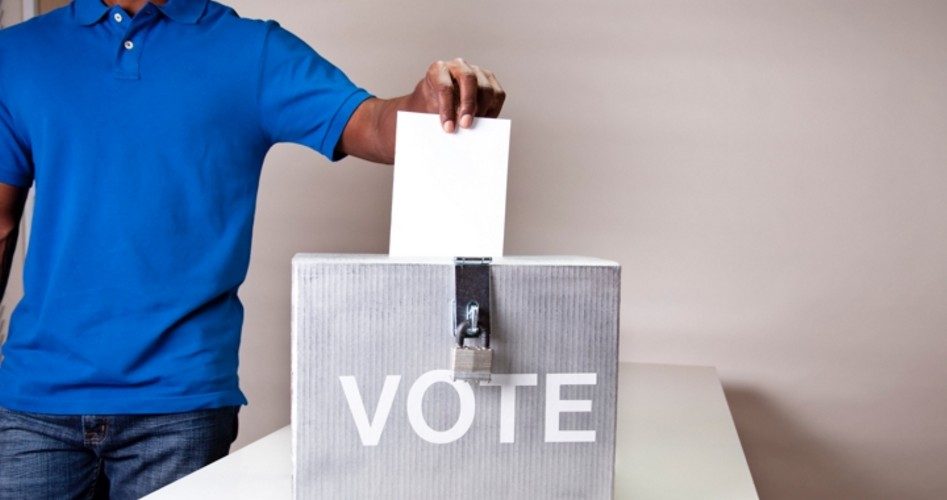
Yesterday — election day 2018 — a reporter was visibly perplexed when a young black man in Georgia, Mikel Cruop, a self-avowed first-time voter, told him that he wanted to see President Donald Trump continue on his present course. He told the reporter that he was voting for the Republican (a white man) over the Democrat (a black woman) in the Georgia governor race.
When the reporter pressed him as to why he would support Trump (as though that were inconceivable), the young man was very blunt: He liked Trump’s opposition to “open borders.” The young man added that he did not like illegal aliens voting in our elections, and he was quite adamant in arguing that it was wrong for illegal immigrants to use our welfare system.
Despite the steady drumbeat from Democratic Party politicians and their allies in the mainstream media that President Trump is a “racist,” his support among African-Americans has risen to levels not seen for a Republican president in decades. According to a Rasmussen poll released on October 29, Trump has an astounding 40 percent approval rating among black voters. Trump’s approval ratings among blacks was only 15 percent in August of last year, but has risen steadily, reaching 29 percent a year later, and now 40 percent.
While this goes against conventional wisdom, it appears to be a growing movement known alternatively as Blaxit or Blexit — a movement to persuade black voters to “exit” the Democratic Party and vote Republican, or at least consider that possibility.
Candace Owens and other black conservatives recently held a young black conservative summit in Washington, D.C., to promote the idea of black Americans switching their multi-generational loyalty to the Democratic Party to the Republican Party. Owens has compared the slavish devotion of blacks to the Democratic Party to “the Democratic plantation.”
Recently, black rapper Kanye West made quite a bit of news with his support for Trump, even praising the president in a televised appearance in the Oval Office. West later backpedaled, seemingly contradicting himself — some say for business reasons.
There have been rumblings of such discontent with the Democrats in the black community for some time, but it has seemed to accelerate in recent years, especially with the election of Trump and the focus on the influx of illegal aliens into the country. Many blacks have expressed irritation at businesses hiring cheaper foreign labor, rather than African-Americans.
When slavery came to an end with the 13th Amendment, the decided majority of most black Americans who could vote, voted for the political party most closely associated with their emancipation, the Republican Party. Eventually, the Democratic Party in the states of the southeastern U.S. became the party of legal segregation. Segregation was such a powerful issue in some states that other issues were relegated to secondary status in political campaigns.
The black allegiance to the Republican Party began to crumble after Herbert Hoover and his party were tarred with the massive unemployment of the Great Depression. Still, a slight majority of blacks voted for Hoover in the election of 1932, when Democrat Franklin Roosevelt ousted Hoover from the White House. By 1934, for the first time, a majority of African-Americans moved to the Democratic Party column, where they have remained.
Despite this, there was a significant black vote for the Republican Party until the 1960s. This began to change when Democrat President Lyndon Johnson signed the 1964 Civil Rights Act.
Today, the mythology spread by the Democrats is that this is why the South started voting Republican, and that the southern segregationists switched parties at that time from Democrat to Republican. However, this is largely untrue, as nearly all major southern segregationist politicians continued their affiliation with the Democratic Party until their deaths. Strom Thurmond of South Carolina, a noted segregationist, did switch from Democrat to Republican, but he is practically the lone exception that proves the rule.
The truth is that the removal of segregation as a viable political issue by the end of the 1960s allowed a more normal political atmosphere to develop in the South. The liberal drift of the national Democratic Party and the popularity of Ronald Reagan had far more to do with the transformation of the South into a Republican bastion than segregation. Southern states were still voting Democrat for president until Reagan. In the first presidential election after 1964, the year the Civil Rights Act was passed, Republican presidential candidate Richard Nixon won few southern states in 1968. He did carry all of them in 1972, but then again, Nixon carried 49 of 50 states in that election.
Family remains the most powerful single predictive factor in determining with which party a person will place his identification. After a couple of decades, voting Democratic had become a family “tradition” with most black voters.
Today, the Democratic Party could not win a national election without the almost monolithic support of black voters. That is why blacks who dare stray from the Democratic Party fold can expect severe criticism, and it explains the unfair vitriol against such notable black political figures as Clarence Thomas, Herman Cain, and Dr. Ben Carson.
This potential loss of the black vote for the Democratic Party could radically change American politics.
Image: fstop123 via iStock / Getty Images Plus



